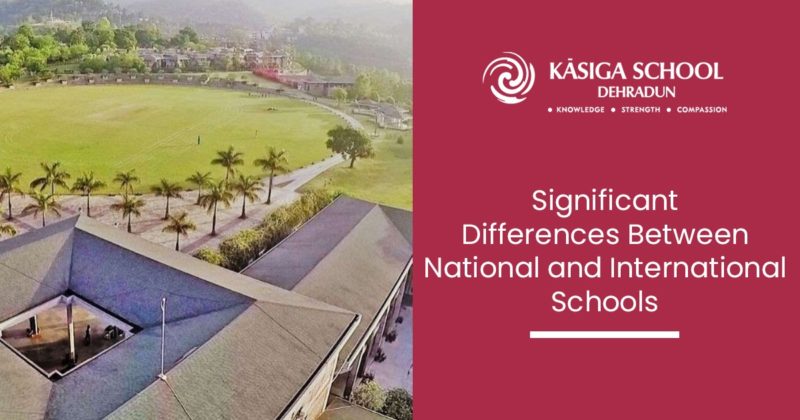As a parent, you want your kid to have a positive learning experience in the greatest possible environment. The question that automatically arises in your mind is, what type of schooling is ideal for your child? As international schools become more popular, you may ask if it is preferable to send your child to an international school rather than a conventional national school.
As a result, it becomes critical to comprehend the key distinctions between a national and an international school before making a choice. So, here are a few aspects that illustrate these distinctions and will assist you in making an informed decision:
Diversity in Culture and Learning
In general, national schools place a strong focus on textbook learning with a rigorous curriculum. While putting an emphasis on learning outside of the classroom and from textbooks, international schools, on the other hand, provide their pupils with a diversified and all-encompassing education. Teachers and students from all across the world attend international schools. This allows children to learn about various cultures and experiences while also learning to be more inclusive.
At Kasiga, we provide a platform for learning for students from both India and a variety of other nations. Additionally, we provide numerous chances in athletics, the creative arts, other pursuits, and frequent exposure to the national and international communities through study excursions, contests, and panel discussions.
Progression Path to Higher Education at Overseas Colleges and Job Opportunities
The majority of foreign colleges favor the curriculum developed by international schools. The greatest international schools, like Kasiga International School in Dehradun, give students more options to apply to and get accepted by the best institutions throughout the world.
These institutions, the majority of which follow an international curriculum such as the IB or CAIE, ensure that their technique of immersive and hands-on education helps students grow as individuals and cultivate an inquisitive mind. Additionally, they provide cutting-edge facilities that promote future leadership development and professional success.
National schools, on the other hand, follow local or India-specific curricula that emphasize grades and provide little to few extracurricular opportunities.
Acquiring Linguistic Skills
The teaching of foreign languages including German, Spanish, French, Japanese, and others is a common practice at Indian international schools. Children who learn a second language learn about various cultures and can better manage their time when they go to study abroad. However, this type of opportunity is not offered to children enrolled in national schools.
Outstanding Infrastructure and Residential boarding
There is no denying that international schools have superior infrastructure and amenities to national institutions. Since the majority of international schools are also residential institutions, they seem to offer on-campus student residences that meet international standards, good athletic facilities, specialized technical laboratories, maker spaces, and student study areas.
This type of enhanced learning environment encourages youngsters to learn swimming, athletics, music, dancing, art, debate, and research, as well as to develop their technical abilities. The buildings are also well-ventilated, and the libraries include a wealth of books and digital publications. These institutions, including Kasiga Boarding School in Dehradun, are also among the top residential and boarding schools in India, cultivating a culture of concern, growth, learning, and empathy.
National schools, on the other hand, provide many of these amenities, but due to the restricted space on which they are built and the constraints of a restrictive curriculum, they cannot compete with the resources supplied by international schools.
Interaction with Educators
Since international schools offer a low student-to-teacher ratio, children receive individual attention and specialized mentorship on a daily basis. For example, Kasiga International School, a premier residential school in Dehradun, is recognized for providing enough opportunity for teachers to become acquainted with each student’s strengths and shortcomings and to assist them in strengthening the strong aspects and correcting the bad ones.
This is why international schools are a popular choice among parents who wish to provide their children with a world-class education. The Kasiga School is committed to providing its students with the most rewarding boarding school experience possible, as well as the finest opportunity to study, develop, and thrive in all aspects of life.
If you are interested in enrolling your kid at Kasiga School, we encourage you to come to our campus. Please contact admissions@kasigaschool.com to arrange a campus tour.


